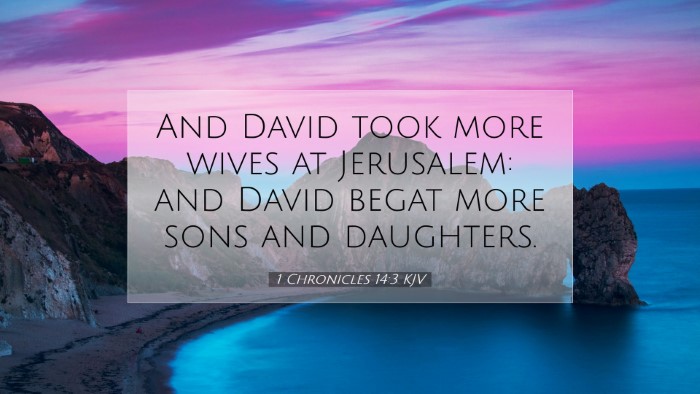Commentary on 1 Chronicles 14:3
Verse: “And David took more wives at Jerusalem: and David begat more sons and daughters.”
Introduction
The historical narrative of 1 Chronicles serves to elucidate the lineage and reign of King David, focusing on his accomplishments and divine favor. This specific verse, 1 Chronicles 14:3, not only presents a factual account of David's domestic life but also reflects broader themes of leadership, covenant, and the nature of God's blessings.
Insights from Public Domain Commentaries
Matthew Henry's Commentary
Matthew Henry emphasizes the significance of David's marriage practices as indicative of his royal authority and position. He notes:
- David’s marriages were a common practice among kings to secure alliances and strengthen his political position.
- Henry suggests that the expanding family indicates God’s blessing on David, paralleling God’s promise to multiply his dynasty.
- He warns, however, that the many wives and children might lead to personal strife, foreshadowing later challenges in David's reign.
Albert Barnes’ Commentary
Albert Barnes offers a detailed examination of the cultural and theological implications of David’s actions:
- Barnes points out that the practice of polygamy during David's time was typical in Near Eastern cultures, highlighting the importance of family lineage.
- He posits that David's taking of more wives reflects his escalating status and success as a king, aligning with the promises God made to him.
- Barnes articulates that this verse serves to illustrate the blessings David received from God, as evidenced by the birth of children—a sign of legacy.
Adam Clarke's Commentary
Adam Clarke discusses the implications of this verse in the context of leadership ethics and divine intention:
- Clarke analyzes the notion that David, while a revered king, may have strayed from God’s original design for marriage, indicating a tension between cultural practices and divine law.
- He emphasizes that the mention of David’s sons and daughters not only serves as a historical note but as a reminder of the heritage and legacy God intends to establish through David.
- Clarke raises a cautionary note regarding the potential pitfalls of wealth and power, suggesting that while success can be seen as divine favor, it may also lead to moral compromise.
Theological Themes
This verse encapsulates several profound theological themes relevant to students of Scripture and pastoral ministry:
- Divine Blessing and Covenant: The multiplication of David's family signifies the continuation of God's covenant with Israel, showcasing His faithfulness to His promises.
- Leadership and Responsibility: David's actions highlight the responsibilities leaders hold, particularly regarding ethical decisions in their personal lives and the potential consequences of straying from God’s intentions.
- Human Weakness: Despite God’s favor, David’s life reveals the struggle between divine blessing and human fallibility, illustrating that even the most favored can make choices leading to future turmoil.
Pastoral Applications
1 Chronicles 14:3 serves as a rich text for pastoral reflection and teaching:
- Reminders of God’s Faithfulness: Pastors can remind their congregations that God’s blessing often follows obedience and faithfulness, encouraging them to live righteously.
- Caution in Leadership: This verse can be used to discuss the weighty nature of leadership decisions, stressing the importance of aligning personal actions with God’s will.
- Hope for Legacy: The genealogical aspect invites reflections on legacy and the impact of one’s life choices on future generations, urging believers to consider what they are building for tomorrow.
Conclusion
In summary, 1 Chronicles 14:3 offers more than a mere historical footnote in David’s life; it provides a window into the complexities of leadership, the nature of divine blessing, and the realities of human choice. Integrating insights from traditional commentaries allows for a deeper understanding that resonates with the experiences of contemporary Christians, prompting both reflection and action in their spiritual journeys.


